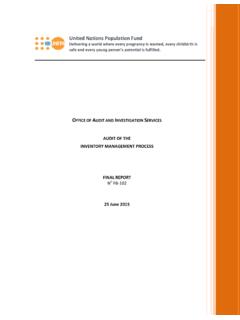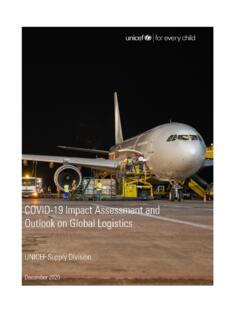Transcription of VEHICLE MANAGEMENT POLICY AND PROCEDURES TABLE …
1 UNFPA Policies and PROCEDURES Manual VEHICLE MANAGEMENT POLICY 12 June 2009 1 VEHICLE MANAGEMENT POLICY AND PROCEDURES TABLE OF CONTENTS A. PRINCIPLES OF UNFPA VEHICLE MANAGEMENT POLICY .. 3 3 Scope .. 3 Delegation of VEHICLE MANAGEMENT Authority .. 3 General Principles .. 4 B. PROVISION, USE, AND CONTROL OF UNFPA VEHICLES .. 6 Roles and Responsibilities .. 6 Provision of UNFPA Vehicles .. 6 Procurement of UNFPA Vehicles .. 7 Use of UNFPA Vehicles .. 9 Control of UNFPA Vehicles .. 16 C. VEHICLE 20 Roles and Responsibilities .. 20 Insurance Coverage .. 20 D. VEHICLE MAINTENANCE, SAFETY, AND PROTECTION .. 24 Roles and Responsibilities .. 24 VEHICLE Maintenance .. 24 VEHICLE Safety and Protection .. 25 E. VEHICLE ACCIDENTS, THEFT AND DISPOSAL .. 29 Roles and Responsibilities .. 29 VEHICLE Accidents .. 29 VEHICLE Theft: Reporting Stolen Vehicles .. 33 Loss, Theft or Damage of Personal Property .. 33 Disposal of Vehicles.
2 33 ANNEXES Annex I: REQUEST FOR USE OF UNFPA VEHICLE FOR UNOFFICIAL PURPOSES FORM .. 34 Annex II: REQUEST TO WAIVE REQUIREMENT OF UNFPA DRIVER FOR OFFICIAL USE .. 35 Annex III: VEHICLE DAILY LOG .. 36 Annex IV: VEHICLE HISTORY RECORD .. 37 Annex V: PETROL COUPON REGISTER .. 38 Annex VI: LIST OF AIG CLAIMS OFFICES worldwide .. 39 UNFPA Policies and PROCEDURES Manual VEHICLE MANAGEMENT POLICY 12 June 2009 2 Annex VII: LIST OF COUNTRIES COVERED UNDER AIG PRIMARY INSURANCE .. 41 Annex VIII: CHANGE IN FLEET INFORMATION FORM .. 42 Annex IX: THIRD PARTY CLAIMANT RELEASE FORM .. 43 Annex X: GUIDELINES FOR SAFE VEHICLE OPERATION .. 44 Annex XI: INFORMATION REQUIRED FOR SUBMISSION OF CLAIM TO AIG .. 49 Annex XII: VEHICLE ACCIDENT FACT SHEET .. 50 UNFPA Policies and PROCEDURES Manual VEHICLE MANAGEMENT POLICY 12 June 2009 3 A. PRINCIPLES OF UNFPA VEHICLE MANAGEMENT POLICY Definitions UNFPA Vehicles: UNFPA office vehicles are defined according to the following criteria: i.
3 Representational vehicles purchased with funds from the UNFPA Biennial Support Budget (BSB) for use in support of the country office; ii. Programme vehicles funded from UNFPA programme funds that are in the custody of the regional director, subregional office director, UNFPA representative, UNFPA country director or, chief of operations or chief of liaison office; iii. Vehicles from other sources that are in the temporary custody of the country office (agencies, government, or funds in trust). Official Use: Official use means the authorised use of a UNFPA VEHICLE to conduct official UNFPA business. Non-Official Use: Non-official use is all other authorised use. Scope These policies for VEHICLE MANAGEMENT apply to the provision, use, control, insurance, maintenance, safety and protection, accidents, and theft of UNFPA owned and controlled vehicles1. Delegation of VEHICLE MANAGEMENT Authority The UNFPA Executive Director has delegated MANAGEMENT and approval authority for the VEHICLE MANAGEMENT function to the Deputy Executive Director (External Relations, United Nations Affairs and MANAGEMENT ), who has further 1 In order to own and control a VEHICLE UNFPA must hold the title and must be in possession of the VEHICLE .
4 UNFPA Policies and PROCEDURES Manual VEHICLE MANAGEMENT POLICY 12 June 2009 4 delegated its authority to the Director, Division for MANAGEMENT Services (DMS). The Director, DMS has delegated his/her authority to UNFPA regional directors, UNFPA subregional office directors, UNFPA representatives, UNFPA country directors, UNDP resident representatives/UNFPA representatives, and to chiefs of liaison offices, hereafter collectively referred to as heads of office , and to the Chief, Facilities and Administrative Services Branch (FASB), who are responsible for ensuring that written operational PROCEDURES for local use of official vehicles are in place and distributed to all staff. UNFPA heads of office and Chief, FASB, may further delegate VEHICLE MANAGEMENT authority to their staff to carry out VEHICLE MANAGEMENT tasks but shall remain responsible for compliance with all relevant financial regulations and rules, and all relevant policies and PROCEDURES .
5 For further detail on delegation of authority, refer to the Roles and Responsibilities paragraph in each chapter below. The delegation of VEHICLE MANAGEMENT authority is granted on an individual basis. Each individual who has been delegated authority to use, record, secure, maintain, and/or dispose of a VEHICLE is responsible for adhering to the policies described herein. General Principles Application of VEHICLE MANAGEMENT Principles: Those responsible for UNFPA VEHICLE MANAGEMENT are to be guided by the following principles: i. Ensure integrity and accuracy in financial and administrative recording and use of vehicles; ii. Ensure the safety and security of all VEHICLE occupants in accordance with United Nations POLICY and local laws governing VEHICLE use; iii. Promote due care and attention to the security, control, and maintenance of vehicles; iv. Safeguard UNFPA interests in the disposal of vehicles and in the case of accident or theft.
6 Compliance with Financial Regulations and Rules and Other Instruments UNFPA Policies and PROCEDURES Manual VEHICLE MANAGEMENT POLICY 12 June 2009 5 All VEHICLE MANAGEMENT must strictly comply with UNFPA financial regulations and rules, procurement PROCEDURES , and all administrative policies and PROCEDURES . As outlined, the delegation of VEHICLE MANAGEMENT authority is granted on an individual basis and requires delegated authorities to adhere to the relevant portions of the controlling legal instruments. In the case of any inconsistency or ambiguity between them, these instruments must be applied in the following order of priority: i. Article 100 of the charter of the United Nations; ii. a. UNFPA Financial Regulations and Rules [ ]; b. Staff Regulations and Rules of the United Nations [ ]; and iii. The applicable policies and PROCEDURES . UNFPA Policies and PROCEDURES Manual VEHICLE MANAGEMENT POLICY 12 June 2009 6 B.
7 PROVISION, USE, AND CONTROL OF UNFPA VEHICLES Roles and Responsibilities UNFPA heads of office and Chief, FASB have responsibility for ensuring the following policies and PROCEDURES are strictly followed. They may delegate authority for VEHICLE MANAGEMENT responsibilities related to the provision, procurement, and recording of VEHICLE data, both upon acquisition and during periodic physical inventory exercises, in accordance with UNFPA financial regulations and rules. Regional Offices/Subregional Offices/Country Offices/Liaison Offices In regional, subregional, liaison and country offices, the VEHICLE focal point (VFP) is responsible for overseeing day-to-day VEHICLE utilisation and for maintaining all associated records. This role is generally delegated to the operations manager, but can be delegated to any staff member as appropriate. All Staff Members All UNFPA staff members are responsible for ensuring that they strictly adhere to the following policies and PROCEDURES regarding their own involvement in the procurement, use, and control of UNFPA vehicles.
8 Provision of UNFPA Vehicles Countries with a UNFPA representative post: a. Each office is entitled to one representation VEHICLE . b. The entitlement to a programme VEHICLE depends on the following criteria: i. the size of the programme; ii. the number of field staff; iii. the number of projects and their geographical distribution; iv. availability and access to the United Nations car pool and car rentals; UNFPA Policies and PROCEDURES Manual VEHICLE MANAGEMENT POLICY 12 June 2009 7 v. the geographical characteristics and quality of public transportation of the duty station; and vi. the availability of programme funds. If these conditions are met, the UNFPA head of office may request approval in writing for the purchase of a programme VEHICLE from the respective regional office. Countries without a UNFPA Representative post: In countries without a UNFPA representative post, there is no representational VEHICLE .
9 Provisions have to be made to ensure that the supervising country office is adequately equipped to execute the UNFPA programme in countries without a UNFPA representative. The acquisition of a programme VEHICLE may be considered under the following circumstances: i. Commercially rented cars or the United Nations car pool are not available for UNFPA use. ii. The nature of the programme, the number and size of the projects and their geographical distribution necessitate frequent monitoring visits. iii. The lack of adequate infrastructure (roads, public transportation etc.) mandates a car for monitoring projects. iv. There are programme funds available. If these conditions are met, the UNFPA country director may request approval in writing for purchase of a programme VEHICLE from the respective regional office. Procurement of UNFPA Vehicles Procurement of Official Vehicles a.
10 Procurement of UNFPA vehicles must strictly follow UNFPA Procurement PROCEDURES [ ]. UNFPA vehicles must conform to UNOPS Catalogue, and must not exceed a limit of 130g CO2/Km emissions, as well as local government regulations ( regarding the size of engines or the use of particular fuel types). UNFPA Policies and PROCEDURES Manual VEHICLE MANAGEMENT POLICY 12 June 2009 8 b. Leasing/Rental Leasing or rental, whichever is the most economical, is recommended only when a VEHICLE is needed for a limited period of time and no other UNFPA VEHICLE is available. No VEHICLE can be leased commercially while a similar VEHICLE is being used temporarily by a staff member for unofficial use. c. Replacement of vehicles: Country Office Representational Vehicles: Representational vehicles may only be replaced when the following conditions are met: i. the VEHICLE has reached 100,000 miles (160,000 kilometres) and/or 5 years of age, whichever occurs first; ii.














